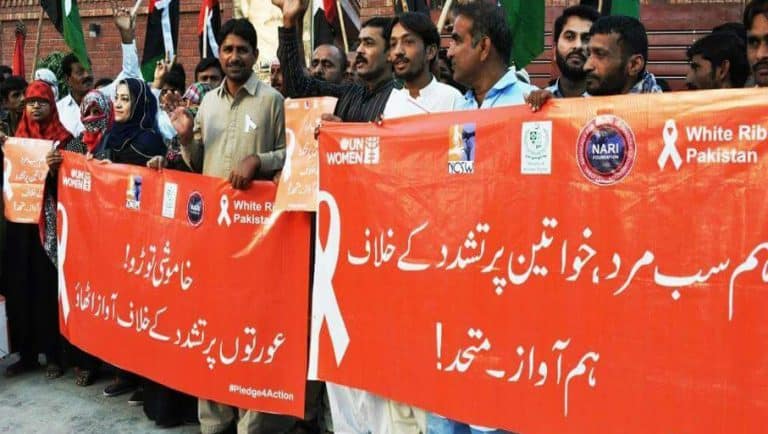
by admin | Oct 25, 2022 | Uncategorized
Sukkur, Friday 24 November 2017: Different organizations including UN women, NARI foundation, NCSW and White Ribbon Pakistan marked the International Day for the Elimination of Violence against Women in Sukkur with the theme “Break silence and raise voices for violence against women”.
In this regard, an awareness walk was held in front of Press Club Sukkur. The walk was attended by a large number of members of PPP and social welfare officers including Fatima Mangi, Anwar Mahar, Safia Baloch, Bisma Waseem, Azra Jamal and others.
The main objective of the walk was to assemble everyone to raise voice on the matter of Gender Violence. Talking on the occasion, participants of the walk said that violence against women can only be ended when men and women will start working as a mutual force.
They said that we all have to raise our voices against the brutalities over women.White Ribbon Pakistan and NARI foundation Sukkur also announced a global campaign on the 16 Days of Activism Against Gender-Based Violence in all areas of Sukkur which will start from 25 November through 10 December against the backdrop of an unprecedented global outcry. 02
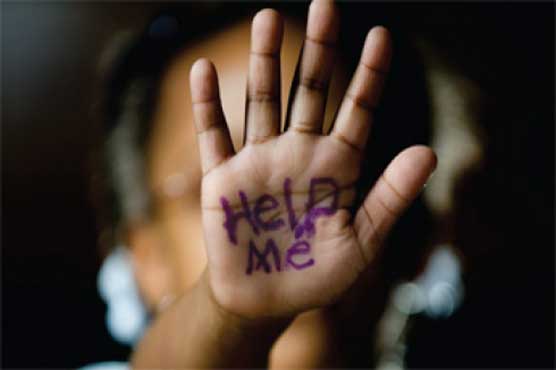
by admin | Oct 25, 2022 | Uncategorized
By Omer Aftab
Mutilated bodies of children found on garbage heaps, girls forced to return sexual favors at educational institutes and workplaces and women consigned to the hell of forced marriages; all of us come across such incidents in routine now. These are just a few forms of the menace, we call sexual terrorism that is widely engulfing our society and as a result, our women and children are living in deep disarray.
Sexual violence manifests itself in a number of different forms with the most commonly recognized form being rape which consists of a wide variety of acts ranging from child sexual abuse, incest,exhibitionism, voyeurism, obscene phone calls, fondling, sexual harassment, ridiculing a woman to try to limit her sexuality, controlling her reproductive choices, withholding sexual activity in an attempt to punish or hurt her, and treating women as immoral or sinful for expressing sexual needs or desires.
The other soft targets of sexual terrorists are children. According to a report, published by a social sector organization, around 11 cases of child abuse are reported each day in Pakistan. Most of the victims lose their lives during or after the act while the survivors live through awful physical and psychological traumas. The dilemma is that we are gradually becoming dumb or used to such acts. A sudden hype is witnessed at the end of human right groups, media, public and the government when a sexual abuse incident comes to spotlight and then the dust is settled.
Also Read:Ways to combat child sexual abuse
Pakistan’s social fabric is based on the teachings of Islam which strictly prohibits any sort of violence, be it physical, sexual or psychological. Moreover, number of laws have been passed during last decade to protect women and children from violence and ensure gender justice in the society. Despite this, we see sexual crimes rising every day.
Sexual terrorism is spreading tentacles not only for the reasons that our legal system is fragile somehow and our society is largely driven by misogynist and patriarchal mindset but there are a number of other contributing factors that we hardly pay attention to.
Lack of education is the root cause whether we admit it or not. Despite some drastic advancements in informational technology and media and different governments’ endeavors to perk up literacy rate during last decade, a huge portion of the society goes on being uneducated and uncultured. When these feral mind are exposed to national and international entertainment media and internet pornography, they are naturally prone to experience sensual behavior which eventually leads to frustration and when this frustration is not channelized, it gives birth to different sexual crimes.
This is turning into a grave mental health issue. This horde of feral and frustrated minds are not only committing sexual crimes, this is hindering the society’s overall well-being and development. So, when we talk about policy making and legal reforms to counter sexual terrorism, we must focus on mental health aspect too.
Another dilemma of our society is communication gap between parents and children and teachers and children. It is one of the prime responsibility of parents and teachers to guide children and adolescents about their sexual health and behavior and train them to deal with odd and unwanted situations confidently. Following the Zainab rape and murder case earlier this year, a campaign of teaching children to differentiate between good touch and bad touch was initiated. This is a good step which must be encouraged and supported.
Also Read:Five Reasons Why Child Abuse Is Rampant In Pakistan
The perpetrators of sexual crimes prey on the atmosphere of silence and helplessness by the victims. In a society like ours, where the interpretations of religion and culture have been historically male-dominated, it is still considered a serious taboo to openly talk about sexual violence and crimes. Thus, a large number of the victims remain tight-lipped for fear of being further morally oppressed and intimidated upon reporting.
To counter and control this endemic, we need to empower our women and give them voice. We see women in the developed world are breaking silence through the #MeToo movement. Our women must join hands too to ensure a violence free society. Media, clergy, administration and civil society need to launch a joint effort to spread awareness and education about combating sexual terrorism and capacitate women and children, through moral and physical trainings, to actively resist and report sexual crimes so that the perpetrators are punished and victims are given relief on time.
The writer is CEO White Ribbon Pakistan and is a development and communications professional with extensive experience in Health Awareness, Behaviour Transformation Communications and Strategic Public Relations. He tweets at @MrOmerAftab.
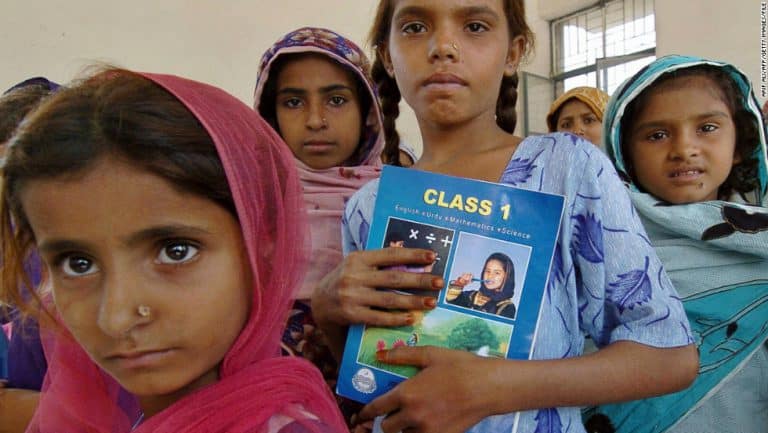
by admin | Oct 25, 2022 | Uncategorized
By Emma Mujahid
The condition of female education in Pakistan is miserable. We as a nation have failed to provide good quality and equitable education to nearly half of our population. Although conventional views and social taboos have played an integral role in impeding its progress, lack of political will and vision among the persons in power, incompetent and insufficient faculty, and poor infrastructure can also be held accountable for the abysmal state of women education.
During the past 67 years, Pakistan has had nine national education policies, five five-year plans, one free and compulsory education act, a constitutional amendment (18th) and dozens of other schemes, seminars, and conferences aimed at improving female education in our country. Unfortunately, no progress has been made.
This is majorly due to lack of political will and commitment. Over the course of our history, not even a single administration has realized the dire need of educating the daughters of our nation. The noble and ambitious plans that were brought forth by various administrations have simply been attractive policies on paper with little or no practical execution.
Both the government and society have always been into misplaced priorities and criminal negligence, underestimating the potential of half of the country’s population.
After all of this, the result is before our eyes. Out of the many obstacles female education is facing today, the deplorable state of our schools, particularly in the villages is at top.
The Pakistan Education Statistics Report for years 2012 to 2013 states that there are 63,914 public schools for girls currently in place: 15.3% are without building, 7.1% are kacha (muddy) schools, 61% lack electricity, 42.4% lack latrines, 44.3 % lack boundary walls, 3.8% are declared dangerous, and 16.1% are in need of major repairs.
To make matters worse, apart from the obvious lack of infrastructure, we also have an acute shortage of motivated individuals who are willing to work as teachers in these schools because they do not see lucrative salaries there.
However, the problems do not just end here. The frequent attacks on women schools and a recent surge in the killings of teachers by the local terrorist group Tehrik-e-Taliban Pakistan (TTP) in tribal areas has also stunted the progress of women’s education in the country.
If we look at all of the cited factors on a whole, these conditions simply show the criminal negligence of the state towards women’s education who make half of the country’s population. We must take a step to improve the deplorable conditions of these schools. The conventional mindset of our society may be something that will take decades to battle, but the lack of infrastructure for schools is something that can be addressed and improved immediately if we put our minds to it.
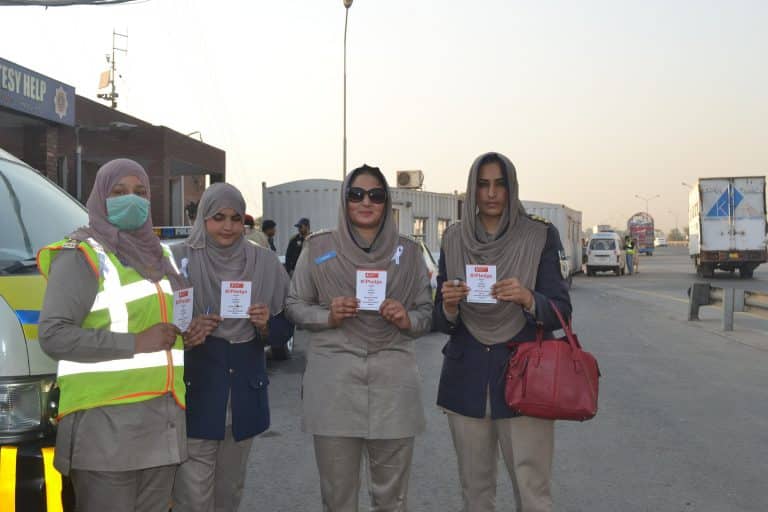
by admin | Oct 25, 2022 | Uncategorized
White Ribbon Campaign Pakistan’s nationwide 16 Days of Activism kick-started yesterday at the eve of International Day for Violence against Women with a landmark on-ground activation in collaboration with National Highways & Motorways Police (NH&MP) at Ravi Toll Plaza, Lahore. This will be followed by a series of activities across the country.
White Ribbon and NH&MP jointly celebrated the White Ribbon Day to reiterate the pledge to eradicate violence against women and ensure gender equality in the society.
White Ribbon’s Chief Executive Officer Mr Omer Aftab and some senior officers of the NH&MP were present at the event.
.
Under the WRCP and NH&MP’s Memorandum of Understanding (MoU), all police officers and constables serving at the country’s motorways and highways will be wearing White Ribbons throughout the 16 Days of Activism.
The White Ribbon team also distributed awareness material among the M2 travellers in a bid to sensitize maximum people to make the Pakistani society free of gender-based discrimination and violence.
Speaking to the media at the event, Mr Aftab told, “The stats of violence against women in Pakistan are shocking and we need a serious and strenuous struggle to stop this menace as this is hampering the nation’s progress.”
“White Ribbon is a men’s movement to end violence against women. Our approach is to engage the men and educate them to treat women with respect and give them their due rights. The concept behind engaging the policemen is to show that real strength of masculinity lays in treating the opposite gender with respect,” he added.
White Ribbon has been working with the unorthodox men-centric approach since last many years and they are running a number of campaigns to achieve their end including the Youth Engagement Program, Community Outreach Program and Strong Men are Gentle Men Program among others.
November 25th is marked as a day of ending violence against women worldwide and it also starts the 16 Days of Activism for this cause. This activism ends at International Human Rights Day on December 10th.
In Pakistan, every 5th woman is subjected to physical violence with 80% of the total women population suffering this. About 40% of all married women go through domestic violence in their lifetime.
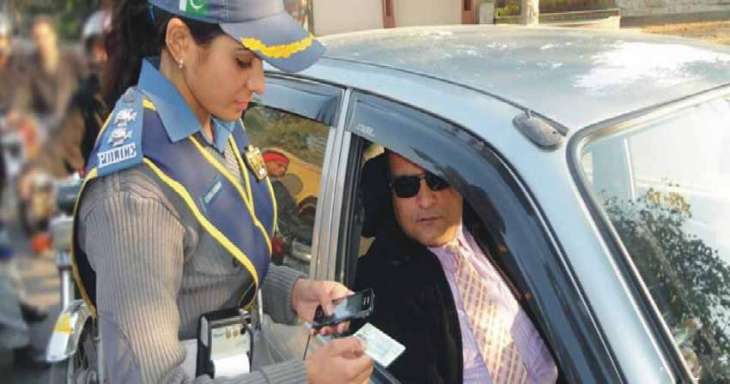
by admin | Oct 25, 2022 | Uncategorized
The City Traffic Police Lahore, in collaboration with the White Ribbon Campaign Pakistan, observed a full-day awareness campaign on Saturday about prevention of violence against women.
LAHORE, (UrduPoint / Pakistan Point News – 8th Dec, 2018 ) :The City Traffic Police Lahore, in collaboration with the White Ribbon Campaign Pakistan, observed a full-day awareness campaign on Saturday about prevention of violence against women.
The joint camp under the supervision of Chief Traffic Officer Capt (R) Liaqat Malik and Chief Executive Office White Ribbon Omer Aftab was organised at Faisal Chowk, here.
This activity was part of White Ribbon’s 16 Days of Activism, which started from Nov 25 and would continue till International Day for Human Rights, falling on Dec 10.
All 2,600 traffic personnel of Lahore will wear white ribbons till Dec 10.
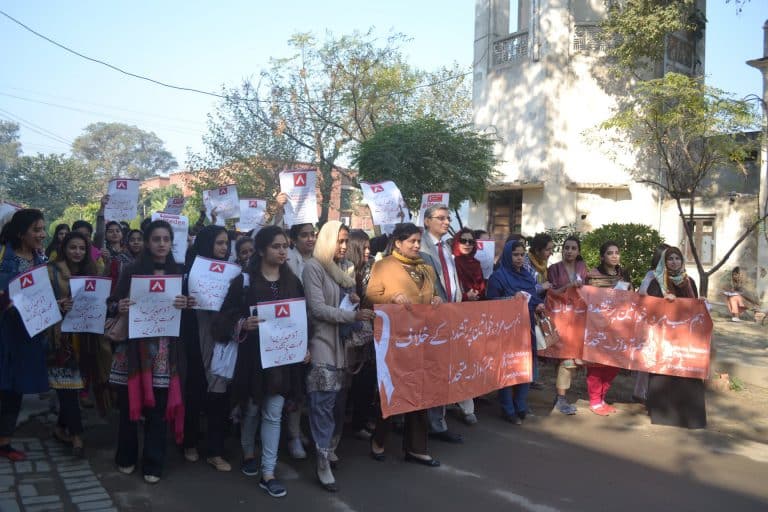
by admin | Oct 25, 2022 | Uncategorized
By White Ribbon Pakistan
Youth is Rising to Curb Violence Against Women!
White Ribbon’s Remarkable Walk Alongside the Students and Faculty of Gender Studies Department of Lahore College For Women University – Official.
#iPledge#EndingViolenceAgainstWomen#WhiteRibbonDay#HearMeToo#16Days
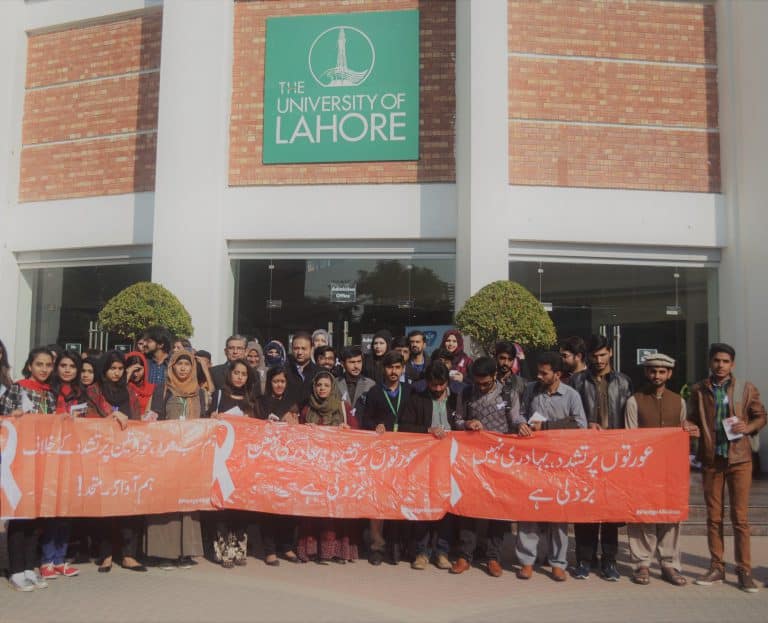
by admin | Oct 25, 2022 | Uncategorized
By White Ribbon Pakistan
University Of Lahore Shows Solidarity with White Ribbon by Organizing a Seminar and a Walk.
Thousands of Students Pledge to Help Eradicating Violence Against Women.
#iPledge
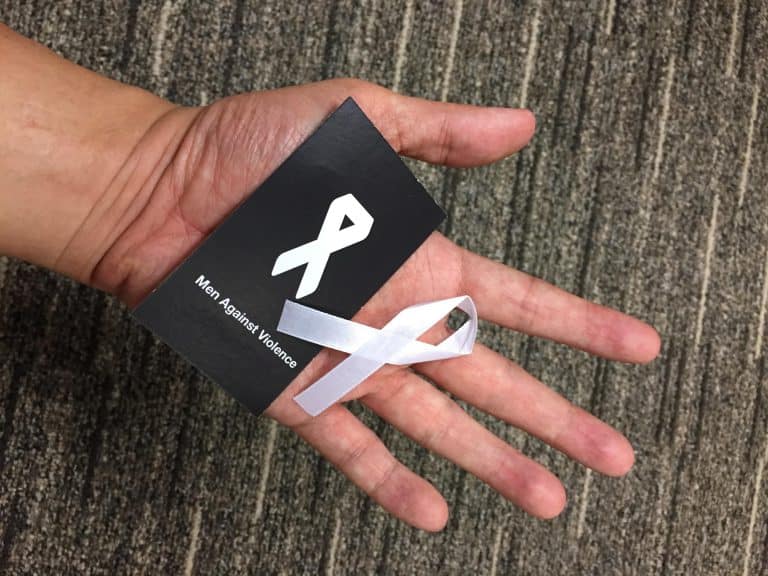
by admin | Oct 25, 2022 | Uncategorized
The question I have been asked at many forums is what solution is there to combat violence against women in Pakistan. I have always been talking about many solutions like strong legislative measures, improved service delivery and infrastructure, increased awareness amongst women, more women in leadership roles and so on.
The truth is, in recent years Pakistan has taken a lot of similar interventions both at the federal and provincial levels. But still the incidence of violence against women (VAW) is increasing with every passing day in this country. This situation is alarming. But not more than the fact that this violence is somehow accepted as we don’t see clear condemnation of such acts from many tiers of the society.
After a decade of my work as a women’s rights activist, I am of the view that the only and long lasting solution is the engagement of men towards gender equality.
In a patriarchal society like ours what could be more pleasing if a perpetrator turns himself into a protector of women’s rights. In a patriarchal system men usually enjoy decision making power including control over economic resources, education, health care and mobility of women of his family. In this situation, contrary to the feminist approach, engagement of men in eradication of VAW is more close to logic and thus, becoming the popular phenomenon.
In Pakistan, White Ribbon initiative is pioneer in this field with a different approach to counter the issue of violence against women. White Ribbon is of the view that generally men do not have the tendency of being violent, rather it is social pressure based on perception of societal standards that evokes them to do so. To help men with this situation we have identified ways to engage men for eradication of violence.
These are as follows:
Let’s talk: One of our major problems is that we do not talk. No one is a mind-reader. If we talk with our partners, we can understand each other’s wishes, thoughts, and desires. Consent should never be assumed.
Act: Rather than watch abuse happen, we can take a more proactive role and become empowered bystanders. This means standing up, speaking out, intervening in potentially harmful situations, or alerting others for assistance. There is always something we can do.
Choose words thoughtfully: We must understand the impact of our language and the words that we use. Using vulgar words to describe women makes it easy for the society to view women as inferior.
Talk with men: We can engage in dialogue with other men about how domestic violence has impacted their lives. We can explore feelings and the costs of being regarded as potential perpetrators of violence, while learning how to best support male-identifying survivors. Talking with other men will also allow a space to discuss ideas on how to challenge and stand up against domestic violence.
Lead by example: Never disregard, excuse, commit, or remain silent about any violence, and particularly that against women and girls. We can be role models for other men and boys in our communities. We can teach our children to be respectful and never abusive towards women. We can be good fathers and equal partners in our relationships.
Organise: We need to engage men in an organised way, such as through affiliation with a movement to keep one energetic and loyal to the cause.
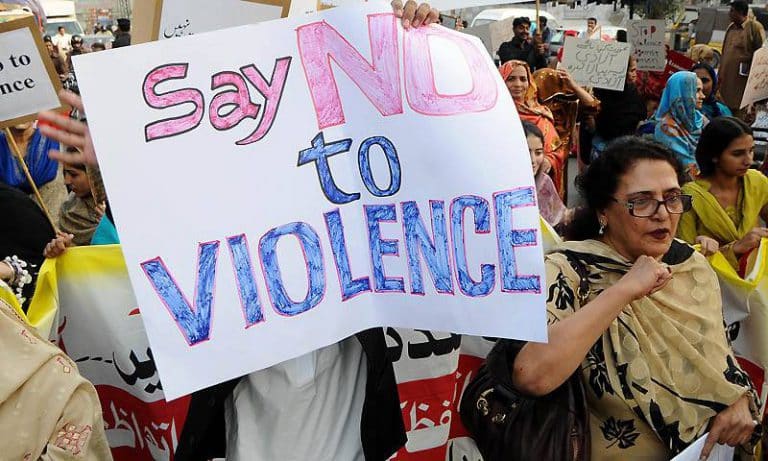
by admin | Oct 25, 2022 | Uncategorized
Violence against women (VAW), also known as gender-based violence, is collectively the violent acts that are primarily committed against women. The United Nations defines violence against women as “any act of gender-based violence that results in, or is likely to result in, physical, sexual or mental harm or suffering to women, including threats of such acts, coercion or arbitrary deprivation of liberty, whether occurring in public or in private life.”
According to Pakistan Demographic and Health Survey 2014, one in every five women in Pakistan is subjected to physical violence, a third of all married women go through it, as well. Over 40 per cent of women suffer spousal abuse at some point. On the other hand, in terms of the Global Gender Gap, Pakistan stands 143 in economic participation and opportunity, 135 in educational attainment, 125 in health and survival and 87 in political empowerment. In 2015 it was recorded that 59% of violence experienced is domestic violence, 14% through being forced into marriages, 5% rapes, 2% inheritance deprivation and 18% other kinds of violence.
Gender inequality is the root cause of violence against women, influenced by the historical and structural power imbalance between women and men which exist in varying degrees. The reason behind the above quoted “cruel stats” in Pakistan is century’s long deep rooted patriarchal system that controls women at three levels – individual, societal and structural.
Whilst individuals suppress the women, the society has norms and traditions which tolerate violence against women. Lack of services and poor legislation are among several kinds of discrimination towards women being perpetuated at the structural level.
Unrealistic norms and values, misinterpretation of religion, false and double standards backed by control of men on recourse and decision power make the situation worst. These factors force women to be dependent on her male counterpart for her economic needs, mobility, and health and education rights.
Although this is a global issue, in our society women are faced with some of the most extreme kinds of violence. In recent years we have witnessed many cases of so called “honor” killing, not only in rural but in urban areas as well. Whereas despite the improvement in laws, ratio of crimes like acid throwing, burning alive, early or forced marriages, kidnapping and rape have also increased. Moreover, bullying, character assassination, workplace harassment and deprivation of due rights are the challenges that Pakistani working women have to deal with along with her regular work tasks.
To eliminate VAW and to make the society more cooperative for half of the population, many efforts have been done in recent past. But a lot of work is still needed, both from the society and the state. Studies have shown that there are some protective factors that can reduce the risk of women and girls of being a victim of VAW. These factors include completion of at least secondary education, women’s economic autonomy and access to skills and trainings, quality response services (judicial, security/protection, social and medical) with trained service providers, and availability of safe spaces or shelters.
To curb this situation White Ribbon Pakistan is working on a unique model of men engagement to end violence against women. For this we are running a nationwide advocacy and awareness campaign calling men to join this movement. We believe that to bring a paradigm sift in the situation it is important to redefine the existing narrative on the status of women in society.
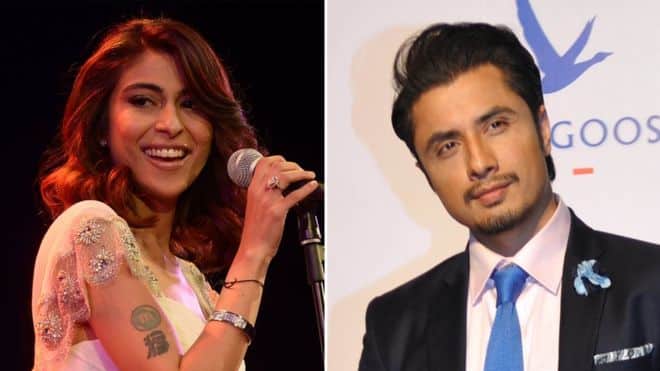
by admin | Oct 25, 2022 | Uncategorized
Sexual harassment doesn’t see status, power, money or fame. It can happen to any person at any time. No woman is ever ‘asking’ for it even if she is not adhering to your definition of morality. Understand consent. Respect her. It just is not okay, ever.
Any activity that is unwelcoming or unwanted especially because it might be of a sexual nature, or have a mere sexual connotation that makes a person feel discomfort of any sort comes under sexual harassment. This activity can make a person feel uncomfortable to an extent where it affects the person’s ability to perform at work or otherwise cause stress. In addition it can cause depression, mental turmoil and even emotional chaos.
Sexual harassment is a common occurrence all across the globe. The fact that it is so widespread does not make it an action that should be spared. While there are laws to protect women against such harassment the public, mostly, is not aware of them. There is a need to create awareness on the legalities surrounding this sensitive yet pressing matter. Women normally are hesitant to report cases of sexual harassment. It is commonly seen that women choose to quietly bear the torment as opposed to gathering the courage to speak up against it. They try to be discreet because they fear the shame that will follow if they draw too much attention to the issue. Hence they choose to, somehow, avoid circumstances leading to sexual harassment. This is seen as standard coping mechanism.
It does take time to deal with the trauma and to seek counsel because instant reaction is guilt and body shame. Victims tend to feel responsible for being violated. When consent is not involved it is never okay. The victim needs to be reassured that it was not something they did that triggered sexual harassment; it was not how she was dressed, or how she may have smiled or how she was walking. The only person responsible for sexual harassment is the violator; the problem lies purely with them. It is the dysfunctional perception of the perpetrator that allows them to sexually objectify another person with complete disregard for appropriacy and morality.
A research conducted in 2008 showed that more than 50% working women face sexual harassment in Pakistan. A total of 24,119 cases were reported pertaining to violence against women in the short period of two years between 2008 and 2010. Among these only 520 filed cases were about sexual harassment faced at workplace by women. A noted case which got some media attention was that of Haleema Rafique, a talented fast bowler, who was driven to suicide due to sexual harassment. Another was that of a flag carrier air hostess who filed a case against the PIA Chairperson for sexually harassing her. This heinous crime has victimised 68% of the girls who shy away from speaking up because of the fear of being condemned by the society even when they are the victims.
Sexual harassment is a plague that has spared no one, Muslim or non-Muslim, one wearing a hijab or clad in western clothes, from developed nations or the under-developed. #MeToo, originally founded by Tarana Burke, was a movement created over a decade ago, but it has taken a long time to become a trending hashtag. It was meant to help sexual assault survivors to gather courage to speak up. Allegations of sexual misconduct against Hollywood producer Harvey Weinstein started surfacing last October, and it is only since then that the #MeToo and #Timesup campaigns have gone global. There has been a surge in accusations against other powerful men since then. However, the movement has just recently caught on in Pakistan, a strongly patriarchal society where we are still fighting for women equality. With Meesha Shafi breaking silence and alleging Ali Zafar of sexual misconduct, other women followed suit. In light of all the backlash and ridicule, whether the accusations are true or not is for the court to decide, but one thing is clear: it takes a lot of courage to step up and admit to being a victim.
Sexual harassment is a crime punishable with imprisonment for three years. Nevertheless, we are a long way from providing a safe haven for women where they can even consider seeking counsel.
The writer is CEO White Ribbon Pakistan and is a development and communications professional with extensive experience in Health Awareness, Behaviour Transformation Communications and Strategic Public Relations. He tweets at @MrOmerAftab.










